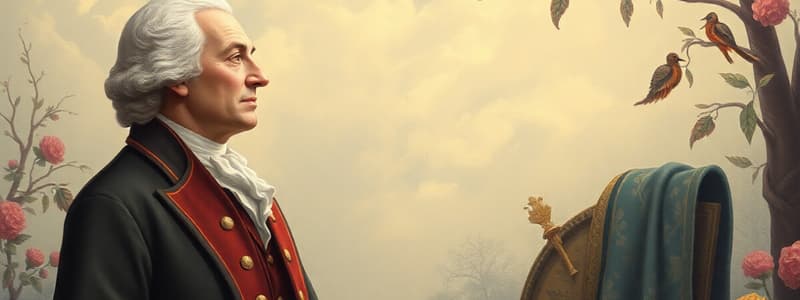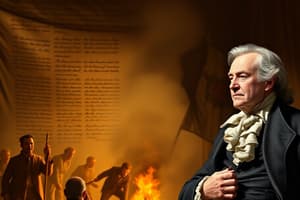Podcast
Questions and Answers
What was George Washington's stance regarding European affairs during his presidency?
What was George Washington's stance regarding European affairs during his presidency?
- He supported American involvement in European conflicts.
- He actively encouraged trade relationships with European powers.
- He sought military alliances with European nations.
- He issued the Proclamation of Neutrality to maintain independence. (correct)
Which financial strategy did Alexander Hamilton NOT advocate for?
Which financial strategy did Alexander Hamilton NOT advocate for?
- A plan for paying off national debt.
- Creation of a national bank based on the elastic clause.
- Strict adherence to the original text of the Constitution. (correct)
- Implementation of a protective tariff on foreign goods.
What precedent did Washington set during the Whiskey Rebellion?
What precedent did Washington set during the Whiskey Rebellion?
- The establishment of the Bill of Rights.
- The use of military force to enforce federal law. (correct)
- The creation of a federal tax system.
- The involvement of Congress in military decisions.
What significant conflict arose between Alexander Hamilton and Thomas Jefferson?
What significant conflict arose between Alexander Hamilton and Thomas Jefferson?
What action did Thomas Jefferson take that contributed to westward expansion?
What action did Thomas Jefferson take that contributed to westward expansion?
What was a key reason for Alexander Hamilton's support of the Bank of the United States?
What was a key reason for Alexander Hamilton's support of the Bank of the United States?
Which event during George Washington's presidency demonstrated the federal government's authority?
Which event during George Washington's presidency demonstrated the federal government's authority?
Which action taken by President Thomas Jefferson conflicted with his strict interpretation of the Constitution?
Which action taken by President Thomas Jefferson conflicted with his strict interpretation of the Constitution?
What major advantage did the elastic clause provide to the U.S. government?
What major advantage did the elastic clause provide to the U.S. government?
How did Alexander Hamilton's financial plan impact the U.S. economy in the 1790s?
How did Alexander Hamilton's financial plan impact the U.S. economy in the 1790s?
Which group benefited the most from the acquisition of the port of New Orleans?
Which group benefited the most from the acquisition of the port of New Orleans?
What was the primary goal of President Thomas Jefferson's decision to purchase the Louisiana territory in 1803?
What was the primary goal of President Thomas Jefferson's decision to purchase the Louisiana territory in 1803?
Which geographical consideration had the greatest influence on President Thomas Jefferson's decision to purchase the Louisiana territory in 1803?
Which geographical consideration had the greatest influence on President Thomas Jefferson's decision to purchase the Louisiana territory in 1803?
What was a major reason for President Thomas Jefferson's purchase of the Louisiana territory?
What was a major reason for President Thomas Jefferson's purchase of the Louisiana territory?
What was one important geographic reason the United States maintained a policy of neutrality throughout most of the 19th century?
What was one important geographic reason the United States maintained a policy of neutrality throughout most of the 19th century?
Flashcards are hidden until you start studying
Study Notes
George Washington
- First President of the United States
- Revolutionary War General
- Issued the Proclamation of Neutrality, keeping the United States independent from European affairs
- Established the first cabinet (group of advisors) to the President
- Used state militia (army) to put down the Whiskey Rebellion, demonstrating the national government’s ability to enforce federal laws
- Believed the United States needed time to gain economic and military strength
- Advocated neutrality and avoiding alliances in his Farewell Address
Alexander Hamilton
- First Secretary of Treasury
- Proposed a national bank to improve the US economy
- Believed the government could create a national bank based on the elastic clause of the Constitution
- Established a financial plan to pay off the US debt
- Advocated for protective tariffs (taxes on foreign goods) to encourage US manufacturing
- Believed the government should exercise all powers necessary to meet its responsibilities, a loose interpretation of the Constitution
Thomas Jefferson
- Opposed Hamilton’s plans, advocating for a strict interpretation of the Constitution
- Believed in avoiding involvement in European affairs (isolationist)
- Authorized the Lewis and Clark expedition to find a route to the Pacific Ocean, helping lead westward expansion
- Purchased the Louisiana Territory while President
- Overcame his strict interpretation of the Constitution to make the purchase
- The purchase was motivated by a desire to control New Orleans and its valuable port, as well as curtailing French and Spanish influence in the area
The Louisiana Purchase
- Secured US control of the Mississippi River and New Orleans
- Provided farmers with a water route to ship their products to market
- Provided the greatest economic benefit to farmers in the Ohio River Valley
- Focused the US on westward expansion
Studying That Suits You
Use AI to generate personalized quizzes and flashcards to suit your learning preferences.




